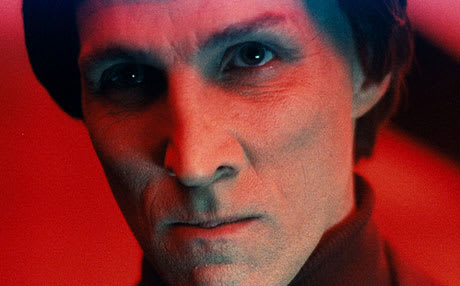Set in the dystopian future of 1983 (yes, you read that right), Beyond the Black Rainbow is an unrelentingly bizarre, hyper-stylized work of psychological, speculative fiction. A visually impressive film that sacrifices narrative coherence for expressiveness, it heralds the arrival of an intriguing new talent in Canadian director/writer Panos Cosmatos.
Beyond the Black Rainbow opens with a kitschy promotional video from the "Arboria Institute," promising happiness and a new way of being. Inside lays Elena (Eva Allan), a sedated near-mute with telekinetic powers and a hyper-sensitivity to noise. Her captor is Barry (Michael Rogers), a tall, gaunt man, with a death-stare. Barry attempts all manner of psychological torture to elicit a response from Elena, to no avail.
That just scratches the surface of what happens in Beyond the Black Rainbow. Plot is secondary (or tertiary, or way, way down the list) to mood, atmosphere and good old-fashioned trippiness. Cosmatos has made the most of his one million-dollar budget, packing in more WTFs per dollar than anyone since Alejandro Jodorowsky.
Pretentious is an adjective that will be bandied about a great deal in regards to this film, and even Cosmatos would be disingenuous to disagree, but that's part of its charm. This film shoots for the grandiose and while much of the hushed dialogue could have easily been excised without changing the essence of the film, it largely succeeds, alternating between head-scratching and jaw-dropping.
Visually, Beyond the Black Rainbow is simply unlike anything explored before in feature-length film. Its visual world recalls the clinical eroticism of pre-Hollywood David Cronenberg, the claustrophobia of John Carpenter's first low-budget feature, Dark Star, the non-representational works of Jordan Belson and the general atmosphere of George Lucas' tale of imprisonment and tyranny, THX-1138.
Featuring a strobing score from Sinoia Caves and a wildly absurd, darkly comic ending, Beyond the Black Rainbow will undoubtedly divide audiences, confounding, challenging, enrapturing and frustrating genre fans and anyone who crosses its path. The future world of 1983 is a strange one indeed.
(Mongrel Media)Beyond the Black Rainbow opens with a kitschy promotional video from the "Arboria Institute," promising happiness and a new way of being. Inside lays Elena (Eva Allan), a sedated near-mute with telekinetic powers and a hyper-sensitivity to noise. Her captor is Barry (Michael Rogers), a tall, gaunt man, with a death-stare. Barry attempts all manner of psychological torture to elicit a response from Elena, to no avail.
That just scratches the surface of what happens in Beyond the Black Rainbow. Plot is secondary (or tertiary, or way, way down the list) to mood, atmosphere and good old-fashioned trippiness. Cosmatos has made the most of his one million-dollar budget, packing in more WTFs per dollar than anyone since Alejandro Jodorowsky.
Pretentious is an adjective that will be bandied about a great deal in regards to this film, and even Cosmatos would be disingenuous to disagree, but that's part of its charm. This film shoots for the grandiose and while much of the hushed dialogue could have easily been excised without changing the essence of the film, it largely succeeds, alternating between head-scratching and jaw-dropping.
Visually, Beyond the Black Rainbow is simply unlike anything explored before in feature-length film. Its visual world recalls the clinical eroticism of pre-Hollywood David Cronenberg, the claustrophobia of John Carpenter's first low-budget feature, Dark Star, the non-representational works of Jordan Belson and the general atmosphere of George Lucas' tale of imprisonment and tyranny, THX-1138.
Featuring a strobing score from Sinoia Caves and a wildly absurd, darkly comic ending, Beyond the Black Rainbow will undoubtedly divide audiences, confounding, challenging, enrapturing and frustrating genre fans and anyone who crosses its path. The future world of 1983 is a strange one indeed.




